Sarah Chapman and Selena Ryan-Vig share evidence from a Cochrane Special Collection, COVID-19: Effective options for quitting smoking during the pandemic. Page last updated: 14 January 2022 and last checked 26 June 2023.
Take-home points
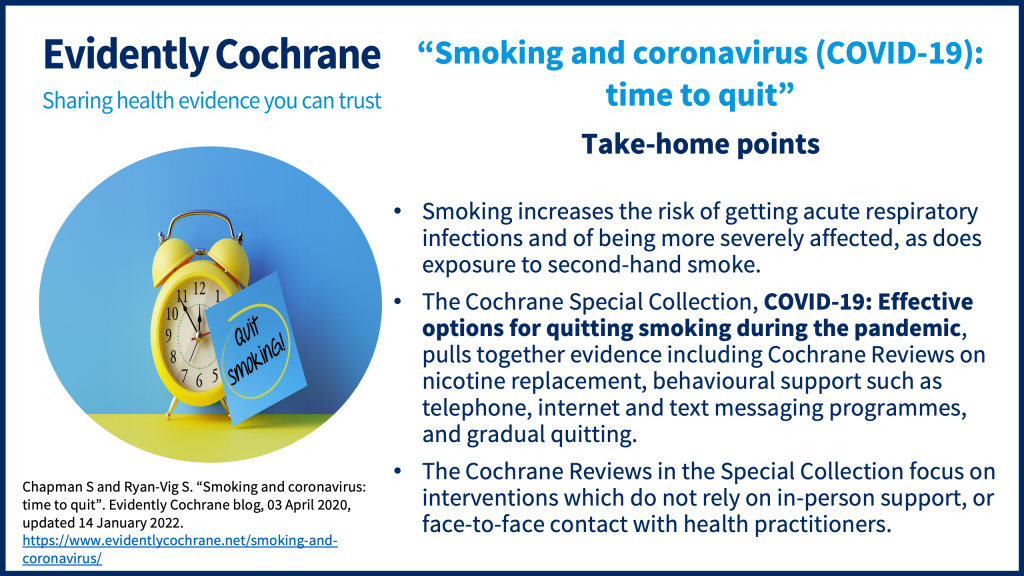
It’s a harsh reality that if you’re a smoker you’re more likely to get acuteA health condition (or episodes of a health condition) that comes on quickly and is short-lived. respiratory infections and have a higher riskA way of expressing the chance of an event taking place, expressed as the number of events divided by the total number of observations or people. It can be stated as ‘the chance of falling were one in four’ (1/4 = 25%). This measure is good no matter the incidence of events i.e. common or infrequent. of those infections becoming severe. The increased risks may come from the damage smoking does to your lungs and the transmission of a virus from hand to mouth while you’re smoking. Exposure to second-hand smoke also increases the risk of getting acute respiratory infections. Given that we are now facing an unprecedented threat from the coronavirus (COVID-19), an acute respiratory infection, there has never been a better time to stop, and the World Health Organization is urging people to do so.
Smoking in England is on the decline
There is evidence that if a smoker can quit for 28 days, they are five times more likely to quit for good. In the context of the pandemic, Public Health England has been encouraging people who smoke to put their lungs first, strengthen their immune system and breathe easier.
There was a rare bit of good news in 2020, with smoking among adults in England at a record low (just under 14%). There was an increase of nearly a quarter (22%) in quit attempts compared to 2019 and an increase of almost two-thirds in the quitting success rateThe speed or frequency of occurrence of an event, usually expressed with respect to time. For instance, a mortality rate might be the number of deaths per year, per 100,000 people. from 14% to 23%. Action on Smoking and Health (ASH) reported in July 2020 that a million people had quit since the start of the pandemic in Britain, with many more young people quitting than older ones.
Evidence-based support to quit smoking
But quitting is hard for many, and perhaps particularly so at a time of great stress and when many of our routines have been disrupted. What’s more, we still may be facing difficulties or delays accessing face-to-face, in-person support for help with things like stopping smoking. However, there are other options for quitting, with evidence to support them.
Cochrane Tobacco Addiction has put together a Special Collection of reviews which provide the best available evidence to inform your decisions on ways you might try to quit. The Cochrane ReviewsCochrane Reviews are systematic reviews. In systematic reviews we search for and summarize studies that answer a specific research question (e.g. is paracetamol effective and safe for treating back pain?). The studies are identified, assessed, and summarized by using a systematic and predefined approach. They inform recommendations for healthcare and research. focus on interventions which do not rely on in-person support, or face-to-face contact with health practitioners.
We also have some mini infographics (below), giving you the key information from some of these Cochrane Reviews, and some blogs.
Cochrane authorSomebody responsible for preparing and, in the case of Cochrane Reviews, keeping up-to-date a systematic review. The term ‘reviewer’ is also sometimes used to refer to an external peer reviewer, or referee., Nicola Lindson from the Nuffield Department of Primary Care Health Sciences, University of Oxford, UK, said “If one method doesn’t work, don’t be discouraged – evidence shows some people need to try to quit many times before successfully doing so. Just because you haven’t been able to quit before, doesn’t mean you won’t be able to now.”
If you can, this is a great time to quit.
Nicotine replacement therapy versus control for smoking cessation
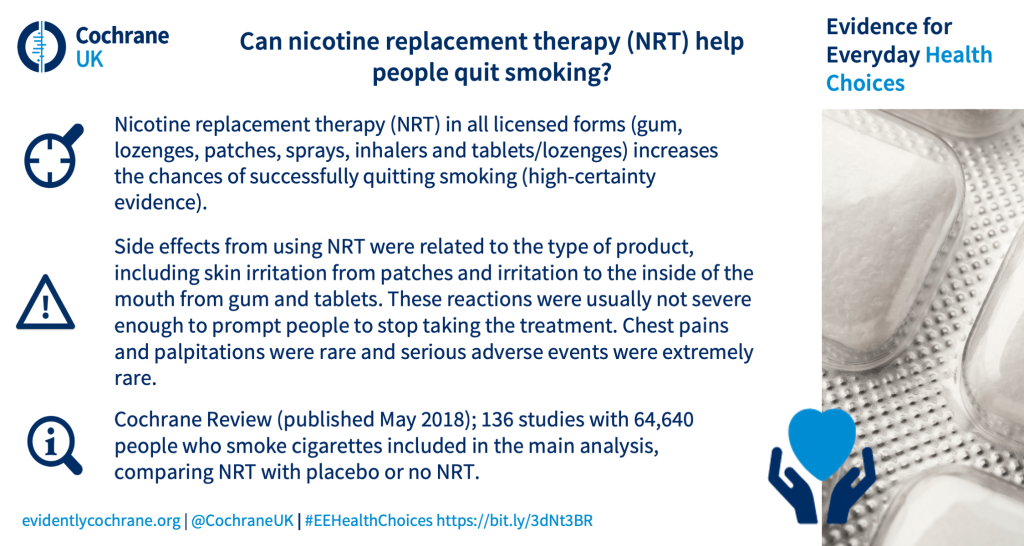
Different doses, durations and modes of delivery of nicotine replacement therapy for smoking cessation
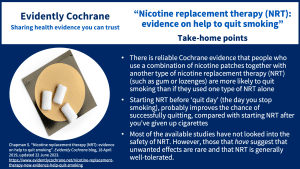
Find out more in our blog: Nicotine replacement therapy (NRT): evidence on help to quit smoking
Mobile phone text messaging and app-based interventions for smoking cessation
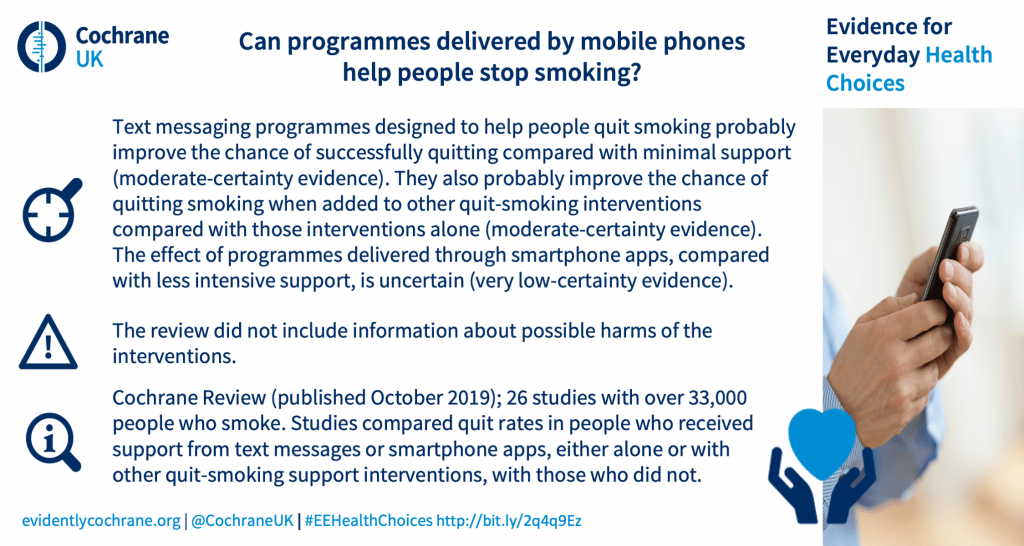
Print-based self-help interventions for smoking cessation
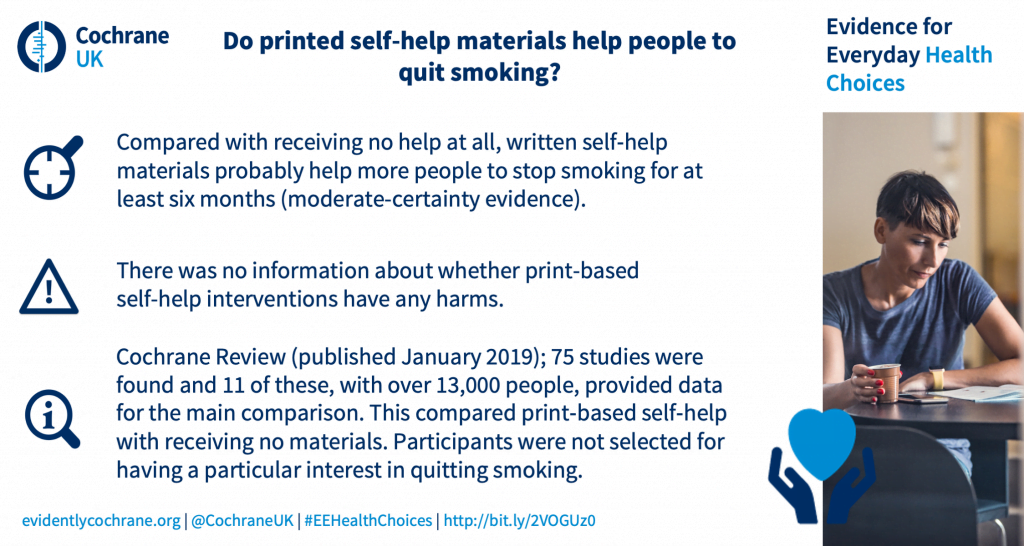
Telephone counselling for smoking cessation
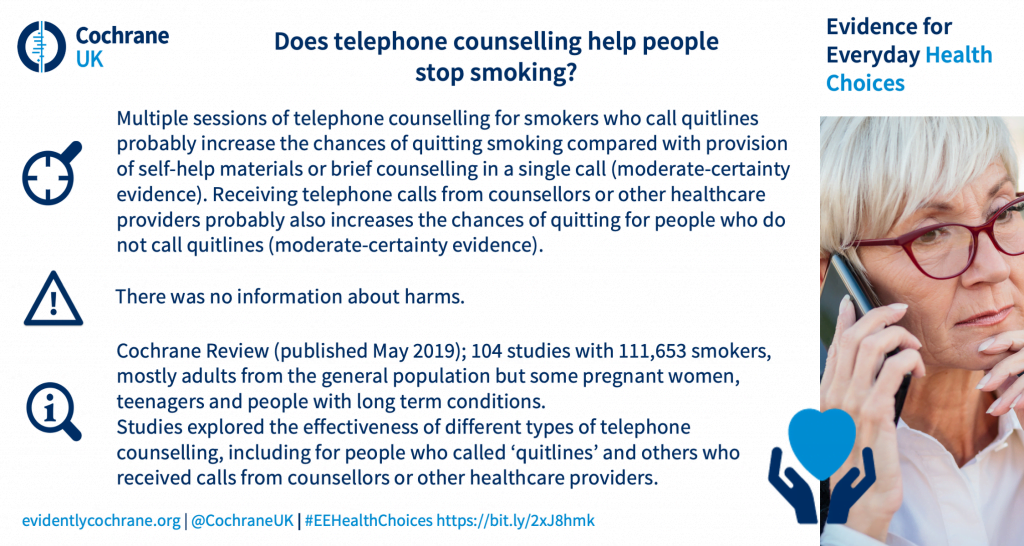
Smoking reduction interventions for smoking cessation
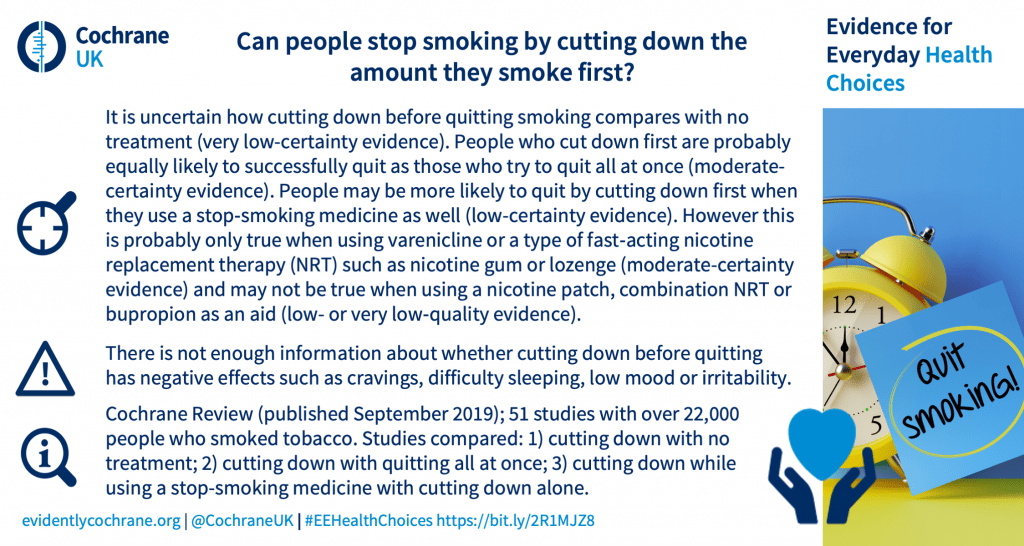
We’ve also blogged about this: What is the best way to stop smoking – should I stop suddenly or cut down first?
There is also a review on Internet-based interventions for smoking cessation.
Evidently Cochrane blogs
- Nicotine replacement therapy: new evidence on help to quit smoking. 18 April 2019.
- Affordable ways to support people who want to stop smoking. 31 May 2019.
- Texting 2 Quit: using mobile phones to support people quit smoking. 18 May 2016, revised 30 October 2019.
- What is the best way to stop smoking – should I stop suddenly or cut down first? 25 October 2019.
Join in the conversation on Twitter with @CochraneUK and @CochraneTAG or leave a comment on the blog. Please note, we will not publish comments that link to commercial sites or appear to endorse commercial products.
Sarah Chapman and Selena Ryan-Vig have nothing to disclose.



It is a great blog post about .I am always read your blog helpful and informative tips. I like it thanks for sharing this information with us .